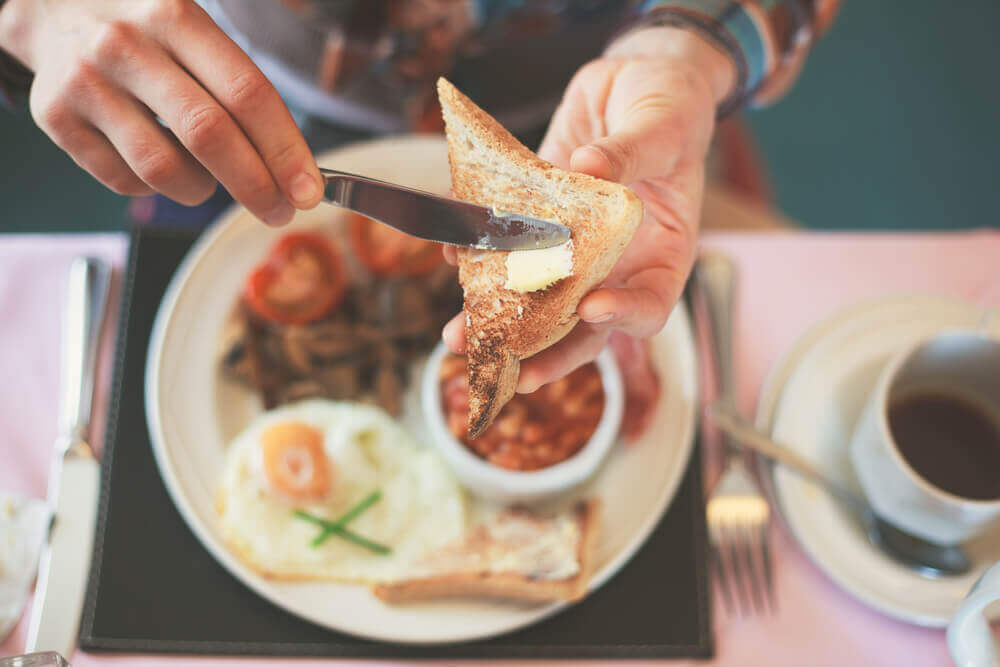Do We Really Need to Eat Breakfast?


Written and verified by the nutritionist Anna Vilarrasa
The claim that breakfast is necessary for a healthy diet has raised serious doubts for a while. The idea behind the necessity and importance of the first meal of the day received a great push from the food industry. This push has been quite successful, as breakfast is the only meal that consists of specific foods.
So, are the claims true? Do we really need to eat breakfast?
Let’s look at the latest findings on this topic.
Do we really need to eat breakfast?
Today, we can say that there’s no meal of the day that’s indispensable. The truth is, many of the studies regarding the benefits of breakfast are observational.
What does this mean? It means that observations have shown that people who eat breakfast tend to be in better health. However, there’s no way to demonstrate that breakfast is the reason for that.
The important thing in terms of nutrition is what we end up eating at the end of the day. We need to eat the right amount to meet our energy needs and, also, it should consist of healthy foods. As is almost always the case, there’s no single formula that’s suitable for everyone in terms of food.
The recommendation for eating 5 meals a day may be valid for some people. However, for others, concentrating all their intake in two more abundant meals may suffice.
For this reason, we need to abandon the idea that there’s a one-size-fits-all meal plan. Rather, each person should adapt their diet and eating habits according to their own needs.

What happens if we skip breakfast?
Some people get up in the morning and don’t feel hungry or want breakfast. O,r they may extend their breakfast intake by drinking coffee or an early morning tea.
This doesn’t mean that they’ll have a worse physical performance or be more tired in the morning. Nor does it mean that they’ll raid the fridge at lunchtime. Each person should know their body and their needs and adapt their meals to them.
In fact, benefits have been observed in the habit of not eating breakfast. These have been studied in some people who follow protocols of intermittent fasting. Sometimes, the 8-hour feeding windows imply skipping breakfast or delaying it for a few hours.
The practice of intermittent fasting has been associated with lower caloric intake, greater weight loss, and improved body composition.
Although it’s advisable to concentrate meals during the day, no harm has been seen in those who eat their meals late at night. Having breakfast and lunch is just as positive as lunch and an early dinner.
Read more: 7 Health Myths that Dietitians Hate
Breakfast on weight loss diets
If we’re dieting to lose weight, do we need to eat breakfast? Having breakfast is one of the most widespread and common recommendations among dieticians.
While other perspectives are gradually gaining ground, it’s always been believed that eating often helps stave off hunger until the next meal AND promotes constant energy expenditure.
These beliefs have gradually faded away. Some studies have concluded that eating little and often doesn’t accelerate weight loss. On the contrary, skipping breakfast could be beneficial because it would reduce total calorie intake.
There’s even data showing that starting to eat breakfast can increase the number of total calories consumed in those who didn’t have this habit.
At the very least, we must be cautious when recommending breakfast for weight loss, since it could have the opposite effect. It’s always necessary to consider the characteristics and particular needs of each person.

When is it best to have breakfast?
When you don’t get to eat enough
Skipping breakfast doesn’t have to be synonymous with eating less, or being undernourished. As we’ve said, it’s very important that, throughout the day, food intake is balanced.
Therefore, breakfast will be necessary if you’re not otherwise able to eat all that your body requires to function well.
If you have digestive problems
It’s not advisable to eat too much when you suffer from problems such as gastritis, slow digestion, hiatal hernia, or if you don’t have a gallbladder. In these cases, eating something during the morning, and even having a small snack in the middle of the morning can be very positive.
Discover more: The Keys to Preventing Nighttime Acid Reflux
When you end up eating whatever you can get your hands on
You wake up in the morning with little time and little hunger, and at mid-morning you go straight to the snack machine for something to munch on. Then, you need to start eating breakfast at home or plan a mid-morning break to introduce healthy foods.
If you’ve eaten too much the night before
If you wake up in the morning not hungry because you’ve eaten too much at night or snacked on junk food before going to bed, then you’re better off correcting your dinners in terms of quality and quantity of food. This way, surely, you’ll gradually get hungrier in the morning.
If you’re going to have breakfast, make it healthy

The evidence seems clear: There’s nothing special about breakfast. If you wake up and are hungry in the morning, or believe that breakfast can improve your diet, then eat a healthy breakfast.
Improving breakfast in terms of quality and variety of food is very important. You need to take advantage of all the advances that have been made in this sense, to work on healthy eating habits in general.
Breakfast is a good time to introduce certain foods and important nutrients into our health:
- Dry fruits. They’re a good source of protein and minerals, especially for vegans. Also, we shouldn’t worry about their fats, as they have a healthy lipid profile.
- Oatmeal, whole grain cereals, or whole-grain bread. They’re a good source of fiber if you a hard time eating enough fruit and vegetable portions.
- Eggs, yogurts, cheese, or tofu. They should be the source of protein in the morning.
- Fruits and vegetables, to accompany granola or toast.
Overall, it’s clear that eating breakfast very healthy if you want to take care of your health. Keep it in mind!
All cited sources were thoroughly reviewed by our team to ensure their quality, reliability, currency, and validity. The bibliography of this article was considered reliable and of academic or scientific accuracy.
- Betts JA et al. Is breakfast the most important meal of the day? Proceedings on the Nutrition Society. Noviembre 2016. 75(4): 464-74.
- Johnston A. Fasting for weight loss: an effective strategy or latest dieting trend? International Journal of Obesity. Mayo 2015. 39(5):727-33.
- Kulovit MG et al. Potential role of meal frequency as a strategy for weight loss and health in overweight or obese adults. Nutrition. Abril 2014. 30(4) 386-92.
- Leidy HJ, Campbell WW. The effects of eating frequency on appetite control and food intake: brief synopsis of controlled feeding studies. The Journal of Nutrition. Diciembre 2010. 141(1) 154-57.
- Levitsky DA, Pakanowski CR. Effect of skipping breakfast on subsequent energy intake. Physiology and Behavior. Julio 2013. 119:9-16.
This text is provided for informational purposes only and does not replace consultation with a professional. If in doubt, consult your specialist.








